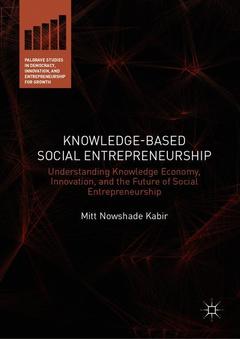Description
Knowledge-Based Social Entrepreneurship, 1st ed. 2019
Understanding Knowledge Economy, Innovation, and the Future of Social Entrepreneurship
Palgrave Studies in Democracy, Innovation, and Entrepreneurship for Growth Series
Author: Kabir Mitt Nowshade
Language: English
Subjects for Knowledge-Based Social Entrepreneurship:
368 p. · 14.8x21 cm · Hardback
Description
/li>Contents
/li>Biography
/li>Comment
/li>
1. Introduction.- 2. Knowledge economy.- 3. Knowledge society.- 4. Technologies of the future.- 5. Knowledge.- 6. Innovation.- 7. Entrepreneurs and entrepreneurship.- 8. Strategy, strategy formulation and business models.- 9. Opportunity development and commercialization.- 10. Conclusion.
Dr. Mitt Nowshade Kabir is a seasoned entrepreneur with broad experience in international business, technology investment, and e-commerce. His present business and academic interests cover strategy, innovation, entrepreneurship, and technologies such as artificial intelligence, semantic technologies, blockchain, and knowledge management. He has served as an advisor to various governments and also consults and helps boards and businesses in areas like advanced technologies, business development, and innovation strategies. Dr. Kabir holds a Ph.D. in Information Technology, an MSc in Computer Science, an MBA, and a Doctorate in Business Administration.




